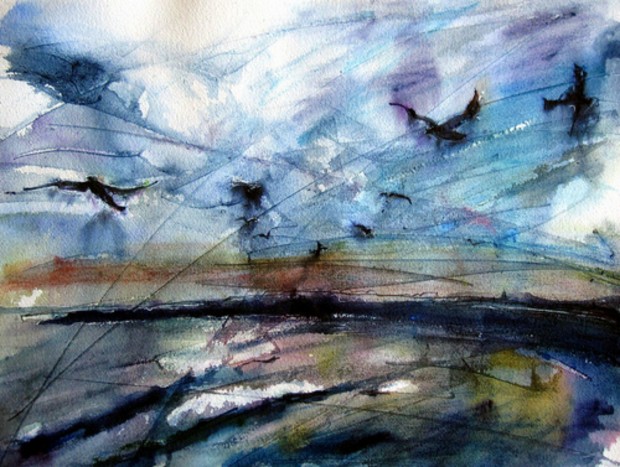You have no items in your cart. Want to get some nice things?
Go shopping
My mother would describe her gynecological problems to strangers. I would be trying on a pair of jeans, and I would hear “womb” or “spasm” over the curtain. The more overpriced the jeans, the more symbolic they were of my escape.
My parents ran a seaside B&B. When I think of it now, I experience a kind of vertigo. You can already picture the wipe-clean tablecloths, the awful framed watercolours, and the semi-permanent fog of fried egg. I blame my social anxieties on this set-up.
Frank surfaced during my last year or two. He was my father’s friend from school and the kind of person who found it funny to raise a carpet stretcher above your head. He and my mother had fun identifying these and other reasons for my distaste. Why he surfaced I don’t know. He had a stiff leg and the sense that he knew something about himself he wasn’t letting on. Though my mother could have been quite clever, she had a habit of attempting to disguise her feelings with an act of airy disinterest. ‘Frank has an appreciation of Y. For your father, it’s just about Z,’ was a typical formulation. My memory of my father then is of a man in torn trousers, stinking of creosote, slamming his metal toolbox here and there; grunting and opening doors with the sore air that no-one was helping him out. Still, her observations bored me.
Frank appeared in the kitchen, or on the stairs where I was forced to wait for him or else attempt to go down as he was going up. He was an offensive person and he found his own views self-evident. I see now how these things could have come to bother me less. How I could have seen them as expressions of a socio-cultural moment in history and then, even better, as anecdotes. Frank had been to Spain and bought my mother some perfume. ‘Some of the women over there, you wouldn’t know they were, …’ he nodded. What, Spanish? I thought. He was a racist of course, but had he lived a few years more he would have been a sex tourist on a plane to Thailand. He wheeled past me on his bad leg. ‘Did you want some perfume too?’
I don’t remember what I said.
‘I can get you some perfume when you’re sixteen,’ he said. ‘You won’t know how to say thank you until then.’
‘Right,’ I said. Probably I did so well at school because I always carried a book so I could disengage from conversations like these. Why my mother was standing there listening was unclear to me, but not entirely out of character.
I don’t remember what happened next, probably I made my dinner and left: that was usually the only reason I was there.
I went to university.
The boys below addressed each other over the girls’ heads and the girls flicked their hair and looked at the boys. None of them saw us. Some of the girls had fat calves and when the wind blew their gowns this was obvious.
One of the boys started singing. Sally rolled her eyes. We had a king-size bar of dairy-milk between us, Sally broke a block with the heel of her hand and ate it in one go. The song was theatrical, but not operatic. Conor, who bought all the chocolate and pastries, was rolling a cigarette. He rolled me one too. We leant out of the window. I blew smoke, wondering if any of the boys in the group would look. I had imagined boys like that looking at me as I talked about Giotto, and if my background were ever mentioned I would have waved my hand. I was ready not to bang-on about having been to state school.
Conor leant out of the window, balancing on the ledge below with his hand.
‘Wankers!’ he shouted.
Conor had been to a minor public school where he had read The Morning Star ostentatiously in the common room.
Conor looked at me, ‘What?’
I tried to re-light my cigarette.
Conor brandished a two-litre bottle of pink Lambrini. I made a face.
We loved our bar. The smell of dust and bar-bleach felt comfortable. Each year someone would graffiti a hammer and sickle on one of the red walls and it made us proud. Why do people congratulate themselves on having had a gap year? we asked. Someone from another college would be talking about saving an English girl in India and Sally would laugh, ‘I used to walk home from school through Peasdale park. Every evening at the gates there would be the same gang of boys. “Take nex’ lefht luv, take nex’ lefht”, they’d say as I went past. The joke was that the next left was a dead-end and there they would rape me.’
That Summer I worked in a hotel bar where the clientele came in with fancy hair-dos and sheer, sequinned scarves wrapped over fat crimson arms. I came back near midnight, microwaved chocolate over cheap cakes and ate them in my room. My mother had moved out, taking the computer with her. I checked my email in her rented living room. She read to me from legal guides on assessing your partner’s assets and magazine articles about hair-dyes implicated in ovarian cancer. I got my exam results. I left.
It is a fact I do not often tell people that my mother was a product of rape. When I say fact, I mean that was what she told me.
You could fall down dead outside Kings Cross and no-one would notice: I tried to explain to my mother what was great about London but of course I shocked her.
It is not important to me that my parents like or approve of the things I have chosen in my life, but I think my mother likes John. He is a much livelier than I am and much better at entertaining parents. She appears to enjoy his company and laughs at his stories, sometimes in a way that seems to give her own partner pause.
Last year my brother got married. My mother is always on edge when my father is around, though she never acknowledges this and always acts as though this is not the case. While my brothers and I were gathered under my father’s instructions she took some photos too, in the way people take photos of Niagara falls, or the Eiffel Tower; because they are there. Perhaps it is only because I am a photographer I notice these things. I know I could say when I take photos I am looking for a moment of truth, but I’m not sure I believe that anymore. For whatever reason these thoughts pre-occupied me as we sat there. I leant into John and he squeezed my arm and I gave him one of those smiles that being in the couple you imagine no-one else sees, but probably everyone else does.
‘That’s a good one,’ my mother said, flicking through her little digital camera, ‘though Nicky, you’re not smiling.’
We were backed against a window. I had not said anything about that, about the light, but now I did. Her eyes widened. ‘Do you remember those photos you used to take?’ She turned to my brothers, then to John, then to me, ‘of your friends on a night out? They were all blurred.’ She looked around smiling then she wobbled, holding her small camera, in illustration. ‘It’s alright,’ she said. I don’t remember what I did then, whether I stared at her or looked away. I suppose that is because at the time I attached no importance it. I remember finding it tedious, but that is all. John did though because he remarked on it later. Without that I’m not sure I would have noticed.
After my mother met John she did things to embarrass me – she drove us past a Mothercare to ask pointed questions, she sent him a guide to sizing your fiancée’s ring-finger. I do not really mind: nothing can be read into these things since they are so awful. I enjoy telling them as anecdotes to new acquaintances; I have found them useful ice-breakers on a long journey with a new team: few people can beat them, and if they can, I am always impressed.

About Rica March
Rica was born and grew up in the North-East. She studied at Cambridge and now lives and works in London.




